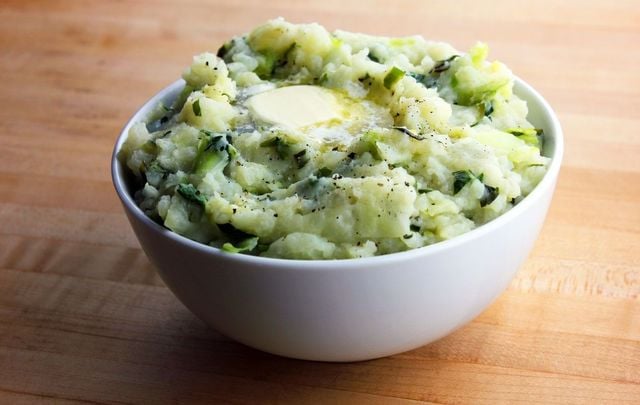Colcannon with its unique and simple recipe has become popular around the world. It normally includes chopped kale or green cabbage mixed with hot, floury mashed potatoes.
This simple recipe is an ideal one to make with the kids. The word colcannon is from the Gaelic "cal ceannann," which literally means "white-headed cabbage."
An Irish Halloween tradition
In the past, charms were mixed in with the colcannon to celebrate Halloween. Depending on what charm you found it was seen as a portent for the future. A button meant you would remain a bachelor and a thimble meant you would remain a spinster for the coming year. A ring meant you would get married and a coin meant you would come into wealth.
Others filled their socks with colcannon and hung them from the handle of the front door in the belief that the first man through the door would be their future husband.
Traditional Irish colcannon recipe
Ingredients:
- 4 lbs (1.8kg) potatoes, or about 7-8 large potatoes (‘old’ potatoes or russet potatoes are best, waxy potatoes won’t do)
- 1 head of green cabbage or kale
- 1 cup ( 7 fl oz, 240 ml) milk (or cream)
- 1 stick (4oz, 120g) butter, divided into three parts
- 4-5 scallions (green onions), chopped*
- Salt and pepper
- Fresh Parsley or chives
*Not everyone adds scallions to colcannon, but they do add something, in my opinion.
Method:
Peel and put them in a pot to boil.
While the potatoes are cooking, remove the core from the cabbage, slice the leaves thinly, and put into a large saucepan. Cover with boiling water from the kettle and keep at a slow rolling boil until the cabbage is just wilted and has turned a darker green. This can take anything from 3-5 minutes, depending on the cabbage. Test it and don’t let it overcook - if anything it should be slightly undercooked.
When the cabbage is cooked, drain it well, squeeze to get any excess moisture out, then return to the saucepan. Add one-third of the butter and cover. Leave it covered and in a warm place, but not on a burner, with the butter melting gently into it while you continue.
When the potatoes are soft, drain the water and return the potatoes to the saucepan. With the drained potatoes in, set the burner to low, leaving the lid off so that any excess moisture can evaporate. When they are perfectly dry, add the milk to the saucepan, along with a third of the butter and the chopped scallions (if you are using them). Allow the milk to warm but not boil – it is about right when the butter has fully melted and the pot is starting to steam.
With a potato masher or a fork, mash the potatoes thoroughly into the butter/milk mixture. Do NOT pass through a ricer or, worse, beat in a mixer as it will make the potatoes gluey and disgusting.
Mix the cabbage thoroughly through the mashed potato.
Before serving, season with a little salt and sprinkle with fresh parsley or chives. Most importantly, make a well in the center of the mound of potato and put the last third of the butter in there to melt.
* Originally published in 2011. Updated in June 2024.




Comments